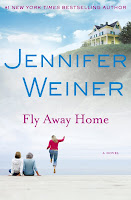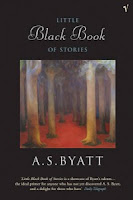 There’s something I’ve discovered about my iPad — it’s incredibly easy for me to buy books with one click. Books I had long ago stopped buying because they were (and I don’t want to use this word) disposable — not that they’re throwaways but that they satisfy the need I sometimes have for the reading equivalent of a girlie movie. When I was pinching my Gail Vaz-Oxlade-inspired pennies, I couldn’t justify buying a book that would only take me an hour to read. I needed to buy books that were an investment, that would keep me occupied for longer than the time it would take to watch a film.
There’s something I’ve discovered about my iPad — it’s incredibly easy for me to buy books with one click. Books I had long ago stopped buying because they were (and I don’t want to use this word) disposable — not that they’re throwaways but that they satisfy the need I sometimes have for the reading equivalent of a girlie movie. When I was pinching my Gail Vaz-Oxlade-inspired pennies, I couldn’t justify buying a book that would only take me an hour to read. I needed to buy books that were an investment, that would keep me occupied for longer than the time it would take to watch a film.
Well, my iPad has changed all that — I can spend less than $15.00 (which is less than the cost of a movie now) and in some cases, less than $10.00 (and let’s not get into a moral discussion of what’s wrong with ebook pricing because I work in publishing, I KNOW), for books that I can read like my mother used to read Harlequin romances, quickly, painlessly and with some tears (because I get so emotionally involved). I don’t always have to be reading literature but it does have a very special place in my book snob heart so forgive me if I’m a bit harsh on these books. Take this all with a grain of salt.
#36 – Fly Away Home
I still remember reading Good in Bed one afternoon when I was home sick from work. I bawled from start to finish. Weiner has a way with writing female characters that just gets to the heart of the hurt that we all seem to carry around. I haven’t read a novel of hers for a while and so I downloaded one thinking it’d be good to read up north last week at the cottage. The situation that starts off the novel feels “ripped from the headlines” Law & Order-esque. The wife of a prominent politician discovers via CNN or something equally horrible (her best friend calls to comfort her re: the news that had just broken) that her husband of x-number of years cheated on her with a not-quite intern. Sylvie Serfer Woodruff has two grown daughters: Diana, an overachieving doctor, and Lizzie, a recovering addict. When each woman hears the news of their father’s affair, they react differently but in each case it becomes a catalyst for change. It’s a very chicklit scenario — the overtly dramatic “event” that spurns women into some sort of evolution as if regular life just isn’t enough to make anyone become introspective, but whatever, the emotional journey each takes throughout the novel is rewarding and I can’t front — I bawled like a baby towards the end. BAWLED. IN FRONT OF COMPANY. AT THE COTTAGE. So it’s a breezy, solid, emotionally rewarding read even if it feels overwhelmingly cliched in many, MANY places.
#37 – An Ideal Wife
I didn’t read this on my iPad, a friend sent me a copy, and Gemma Townley used to be one of my favourite chicklit writers — I always felt she was one step above so many of her counterparts. Her characters felt fresh, their lives just that little bit more interesting, but I’m no longer in my 20s or even early 30s and I’m less charmed by her books as I once was. An Ideal Wife follows Jessica Wild, a protagonist from two earlier books, and she’s never been my favourite. The hijinks that happen in the book feel contrived and I could tell what was going to happen almost from the beginning pages. In a sense, I think it’s the curse of a successful mid-list chicklit writer, the sales are good so the publisher puts you on a book-a-year treadmill and so you start churning out titles to suit the schedule and not the work. I’ll still recommend Townley over writers like Giffin and the like, simply because I’ve met her in person and she was AWESOME, but the last three books, in fact, the whole Jessica Wild series, has kind of disappointed me.
#38, #39 – The Sookie Stackhouse series (Dead Until Dark & Living Dead in Dallas)
Oh sweet Sundays I’m obsessed with a capital “O” with True Blood these days. It’s smart, sexy, fun, silly, fascinating, and now almost complete with fairies (as per Sookie’s reveal). Contrary to Salon, I don’t think fairies are lame and neither would about a half-dozen YA writers I know. But I digress. I’m dying for spoilers — even those trapped in cliched, irritating, truly terrible writing. Wait, did I just start to review the books? I know you have to give over to the nature of them, to the silly, candy-like essence of these books but I can’t help but feel my intelligence slipping away each time Sookie curls her hair or has someone comment on her perfect breasts. I’ve imbued the literary characters with a little of the spirited nature of the television show and that makes the writing a tad more palatable but I can’t help but wonder if Charlaine Harris doesn’t spend hours laughing her way to the bank over her royalty statements. What a fast one she’s pulled on all of us — there’s so little in the way of actual writing here vs. pure narration for the sake of narration that I’m not surprised it only takes me a little over three subway rides to get through one book (my commute is anywhere from 20 minutes to 45 minutes depending on the TTC). And it’s not that I’m NOT addictively flipping pages — it’s that I AM. I’m not reading. I’m scanning. I’m dying to know what happens just so I can know what happens and not at all because I’m enjoying the writing. I roll my eyes more times than I can count but I respect Harris for her success and I’ll probably read all eight of the books that I downloaded last week.
#40 – Gone
Anyway, I felt a little sick to my stomach after reading so much chicklit in a row that this weekend I took Mo Hayder’s EXCELLENT new novel, Gone (published in Canada this January), away with me to the cottage and then proceeded to stay up very, very late to finish it. It’s a Jack Caffrey novel and it picks up relatively soon after Skin ended. There’s a new case in town — a man’s carjacking comes with a twist: he’s only taking cars with children in them, and the deeper Jack Caffrey gets into the case, the more goes wrong. Mo Hayder’s novels are suspenseful, terrifying, impeccably written and researched and this series just gets better with each novel. I know January is a long time to wait but if you’re at all interested in top-notch thrillers, why not give Ritual or Skin a try before then?







